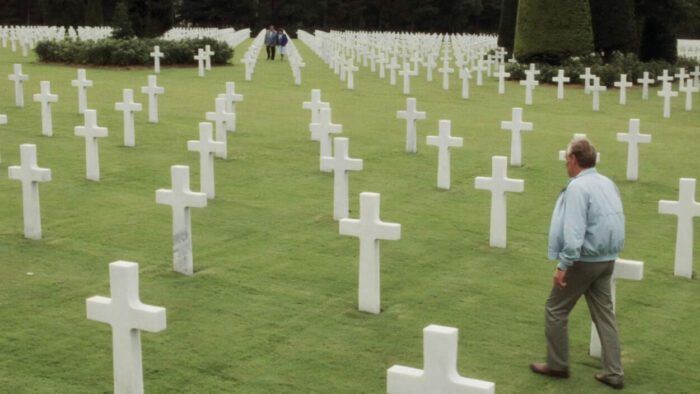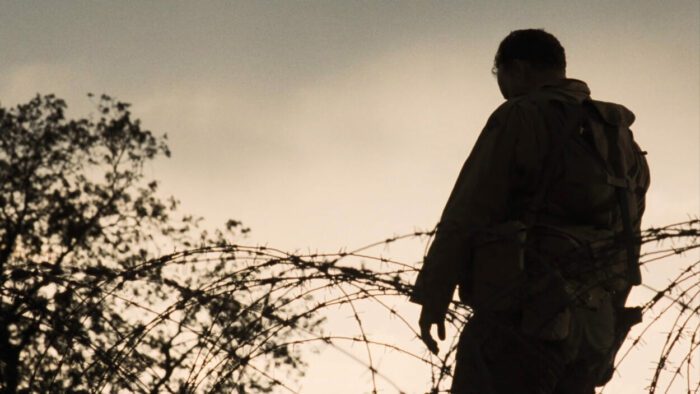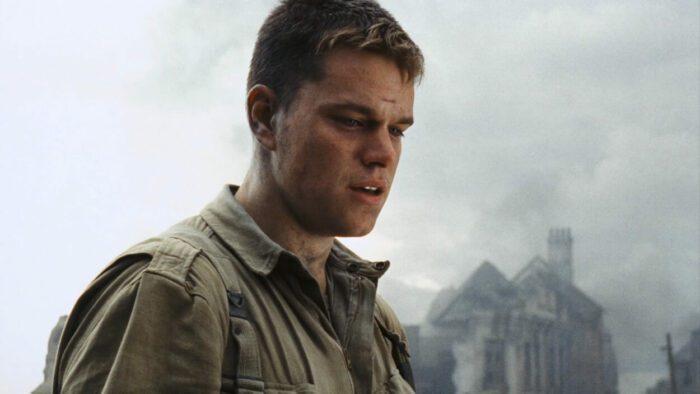When it came time to rewatch Saving Private Ryan for the first time in years, one question came to mind: can a war film be neither pro- nor anti-war? It seems, if we choose to deal in binaries, it must be one or the other. Of course, we don’t have to look at anything in a binary light, particularly art. As such, I’ve come to the conclusion that Steven Spielberg’s Oscar-winning film isn’t concerned with such distinctions. It’s very much a well-made entertainment that’s less about being anti- or pro-war and more about the challenge of risking one’s life for the life of another.
Possibly sacrificing one’s life to ensure the survival of another can undoubtedly be seen as both anti- and pro-war. For the former, why should war exist if it concerns people losing their lives? Regarding the latter, since war does exist, people should be doing what they can to save lives. Either way, though, none of this is mutually exclusive. Let’s say a man is rushing home during a storm. As he passes a bridge, he sees a child in the water who needs help. Even though there’s a very real chance that in trying to save the child’s life he will lose his own, he does it. In this scenario, war is not a factor.
All of that said, why then does Spielberg bother to tell a story like this during World War II? I suppose it could be because he’s ultimately making either an anti-war or pro-war statement. Or there could be another reason. Here’s what he had to say to the Los Angeles Times in 2018:
“I picked World War II because, growing up, it was the seminal conversation inside my family. My parents talked about the Holocaust and they talked about World War II. And I was born knowing this. My dad was a veteran—he’s still with us, thank God, 101 years old—he was in the Army Air Corps from 1942 to the beginning of 1945. He had many veterans over to the house, and I became absolutely obsessed with the Second World War, based on my father’s stories, recollections and also based on all the World War II movies that eventually began playing on American television.”
One of the things I love about Spielberg, and one of the criticisms of his work over the past several decades, is that he strives for entertainment. This is clear throughout Saving Private Ryan, which I’ll get to shortly, but as with his best work, he doesn’t forget that his films are also about people. It makes sense to me that he chose to make a World War II film both because of the movies he saw growing up as well as his father’s war stories.

As such, the film contains bookends that have been criticized, but seen in the context above, I get why we see an elder Ryan at the beginning and the end of the movie. In a sense, that’s Spielberg’s father, a vet who got to live while others died. Is it sentimental? Sure. But it’s the kind of sentimentality that makes sense in a work like this. Saving Private Ryan is literally about a group of men sent to find the eponymous Ryan so that he can be sent home. It makes sense to me that we would see how he turned out and how he carries with him the enormous responsibility to live a good life, to “earn this,” as Captain Miller (Tom Hanks) tells him before he dies.
It also makes sense that Spielberg would want audiences to understand that the individuals dying throughout the film weren’t just anonymous soldiers. They were human beings. The shots of the gravestones suggest this, to me at least. I appreciate the opening and closing scenes because removing them would diminish Spielberg’s point. The grave sites of soldiers remind people that they died so that life could go on.
Of course, it’s possible that that’s a superficial way of looking at things. This is why there’s a dichotomy between anti- and pro-war stances. So, a big part of war is that soldiers sacrifice their lives for others. What does that ultimately mean? Is war a necessary evil? Or is war something that we should strive against because it entails so much death? I understand that if the film isn’t concerned with such questions that it could be seen as lacking. Spielberg could if he wanted to, take a clear stance on the subject.
Again, I don’t believe that’s the point of the film, nor do I see that as a negative. For example, let’s look at the Omaha Beach sequence. After 25 years, it is still an impressive piece of filmmaking, from the cinematography and sound to the music and the performances. It’s very well made.
Now, on the one hand, it’s an exhilarating and frightening sequence that changed war films forever. It’s brutal and realistic, while also being entertaining. On the other hand, this is where controversy comes in, because should a sequence like this be entertaining? After all, the Normandy Invasion is something that actually happened. Real flesh and blood humans died in battle. Does Spielberg, and by extension everyone else involved in the making of this, have the right to take this and make a movie out of it? Does any filmmaker?

I am not a soldier nor a veteran, so perhaps what I’m about to write holds little value, but I believe filmmakers have the right to tell any story they want to tell. I also believe audiences can disagree and react negatively to a film. Personally, Saving Private Ryan works because it isn’t simply telling audiences that war is bad, nor does it glorify it. There’s a reason, beyond storytelling, why we get to know these men. It’s because, when they die, we feel it. There’s no glory in them dying, but there’s also no judgment. They died so Ryan could live, period.
Whether it’s anti-war or pro-war does not matter. Spielberg’s not here to preach. This isn’t All Quiet on the Western Front (any version), nor is it The Longest Day. Again, it’s just about the people and whether dying for someone else is the right thing to do. A critical moment in the entire film is when Reiben (Edward Burns) and Horvath (Tom Sizemore) argue about risking their lives to “save one guy.” Things get real, and it’s up to Miller to explain their mission and ultimately what the film is saying:
“Sometimes I wonder if I’ve changed so much my wife is even going to recognize me, whenever it is that I get back to her. And how I’ll ever be able to tell her about days like today. Ah, Ryan. I don’t know anything about Ryan. I don’t care. The man means nothing to me. It’s just a name. But if… You know if going to Rumelle and finding him so that he can go home. If that earns me the right to get back to my wife, then that’s my mission.”
Does this take anything away from Miller’s actions? Is he less of a hero because he’s simply following his orders? Or is he a hero because he’s following orders? To me, it’s simple. For Miller, his orders are to save a life. How is that any different than a soldier’s duty on the battlefield? Miller is doing what he signed up to do. He’s fighting to save lives.
It’s something a person like me can never truly understand. Like Spielberg, I’ve watched a lot of war movies. Some are entertaining and some are grim. There are well-made ones and some that are pretty bad. Regardless, they’re films. They are not documentaries, let alone reality. Saving Private Ryan accomplishes what it sets out to do: entertain and tell a story about sacrifice. Both are near-universal concepts that most can understand. War is more complicated and can only really be understood by those who’ve been in it.
Spielberg does his best to not judge his characters. As a viewer, I understand why Horvath pulls out his gun during that argument I mentioned above, and even though it’s a brutal and ugly moment, I also understand why Upham freezes and doesn’t even try to save Mellish. The reason I’m able to do so is because Spielberg isn’t telling me how to think. He’s telling a story, so he also steps back and allows his characters to be people. I suppose we can thank his father, Arnold Spielberg, for that.

Saving Private Ryan is one of Steven Spielberg’s great films. It earned him his second Oscar for directing, and even after 25 years, it hasn’t dated. Watching it in 4K took me back to seeing it in a theater all of those years ago. I was reminded of everything I’ve written about, but also, I was reminded that not everything has to be one way or the other. What I’m saying is that the film isn’t interested in being either anti or pro-war, because perhaps it’s both.
Yes, it’s about entertaining an audience and telling a story about sacrifice. And maybe it’s also about how war is so complicated that those risking their lives will do so even when they disagree. Shouldn’t we save others? Yes. Of course, not having to in the first place would be even better.




